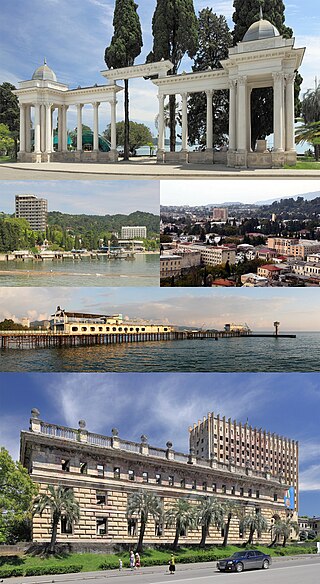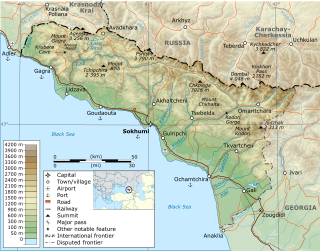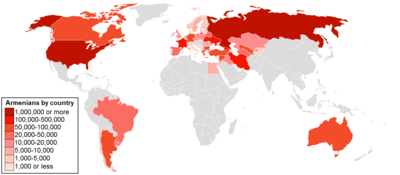
Gagra is a town in Abkhazia/Georgia, sprawling for 5 km on the northeast coast of the Black Sea, at the foot of the Caucasus Mountains. Its subtropical climate made Gagra a popular health resort in Imperial Russian and Soviet times.

The Abkhazians or Abkhazes are a Northwest Caucasian ethnic group, mainly living in Abkhazia, a disputed region on the northeastern coast of the Black Sea. A large Abkhaz diaspora population resides in Turkey, the origins of which lie in the population movements from the Caucasus in the late 19th century. Many Abkhaz also live in other parts of the former Soviet Union, particularly in Russia and Ukraine.

Sukhumi or Sukhum, also known by its Georgian name Sokhumi or Abkhaz name Aqwa, is a city in a wide bay on the Black Sea's eastern coast. It is both the capital and largest city of the Republic of Abkhazia, a partially recognised state widely recognized as a part of Georgia. The city has been controlled by Abkhazia since the Abkhazian war in 1992–93. The city, which has an airport, is a port, major rail junction and a holiday resort because of its beaches, sanatoriums, mineral-water spas and semitropical climate. It is also a member of the International Black Sea Club.

The ethnic cleansing of Georgians in Abkhazia, also known in Georgia as the genocide of Georgians in Abkhazia, refers to the ethnic cleansing, massacres, and forced mass expulsion of thousands of ethnic Georgians living in Abkhazia during the Georgian-Abkhaz conflict of 1992–1993 and 1998 at the hands of Abkhaz separatists and their allies. Armenians, Greeks, Russians, and opposing Abkhazians were also killed.
The Sukhumi massacre took place on 27 September 1993, during and after the fall of Sukhumi into separatist hands in the course of the War in Abkhazia. It was perpetrated against Georgian civilians of Sukhumi, mainly by militia forces of Abkhaz separatists and North Caucasian allies. It became part of a violent ethnic cleansing campaign carried out by the separatists.

The history of Abkhazia, a region in the South Caucasus, spans more than 5,000 years from its settlement by the lower-paleolithic hunter-gatherers to its present status as a partially recognized state.
The Bagramyan Battalion, also known officially as the Independent Motorized Rifle Battalion named after Marshal Ivan Khristoforovich Baghramyan was a unit formed in Abkhazia and predominantly composed of ethnic Armenians living in Abkhazia that fought together with separatist Abkhaz forces during the War in Abkhazia (1992–93). Named in honour of the Soviet Armenian Marshal Ivan Bagramyan, the battalion fought against the forces of Georgia. It was subsequently disbanded.

The War in Abkhazia was fought between Georgian government forces for the most part and Abkhaz separatist forces, Russian government armed forces and North Caucasian militants between 1992 and 1993. Ethnic Georgians who lived in Abkhazia fought largely on the side of Georgian government forces. Ethnic Armenians and Russians within Abkhazia's population largely supported the Abkhazians and many fought on their side. The separatists received support from thousands of North Caucasus and Cossack militants and from the Russian Federation forces stationed in and near Abkhazia.
Football is a major sport in Abkhazia. During Soviet times, the main club within Abkhazia itself was FC Dinamo Sukhumi, but Abkhazian footballers were prominent in the Georgian team FC Dinamo Tbilisi and in other Soviet teams. In 1994, after its declaration of independence from Georgia, Abkhazia organised a nine-team amateur league.

The history of the Jews in Abkhazia dates back to the early 19th century. The Jewish population of Abkhazia consisted of Ashkenazi, Georgian and other Jews. It grew after the incorporation of Abkhazia into the Russian Empire in the middle of the 19th century. Most of the Jews left or were evacuated from Abkhazia as a result of the Georgian-Abkhazian conflict of 1992–1993.

The Abkhazian Armed Forces are the military forces of Abkhazia. The forces were officially created on 12 October 1992, after the outbreak of the 1992–1993 war with Georgia. The basis of the armed forces was formed by the ethnic Abkhaz National Guard. The Abkhaz military is primarily a ground force but includes small sea and air units. According to the authorities of the Republic of Abkhazia, the Abkhazian Land Forces are organised along the Swiss model – in time of peace they have personnel of 3,000 to 5,000 and in case of war further 40–50,000 reservists are called out. Georgia regards the Abkhaz armed forces as "unlawful military formations" and accuses Russia of supplying and training the Abkhaz troops.

During the Soviet-era, the Abkhaz ASSR was divided into six raions (districts) named after their respective capitals.
Many inhabitants of Abkhazia are Orthodox Christians, With significant minorities adhering to Islam and the Abkhaz neopaganism, or the "Abkhazian traditional religion". The influence of this last has always remained strong and has been experiencing a revival through the 1990s and 2000s.
The demographics of Abkhazia include population density, ethnicity, education level, health, socioeconomic status, religious affiliations and other aspects of the population.

Abkhazian railway is a rail operator in the partially recognised state of Abkhazia. Under a monopoly agreement, it is fully managed and partially owned by Russian Railways for a ten year contract from 2009-2019.
In June and July 2008 a series of bombings took place in Georgia's breakaway republic of Abkhazia, killing 4 and injuring 18 people.

Abkhazia, officially the Republic of Abkhazia, is a partially recognised state in the South Caucasus, on the eastern coast of the Black Sea, at the intersection of Eastern Europe and Western Asia. It covers 8,665 square kilometres (3,346 sq mi) and has a population of around 245,000. Its capital and largest city is Sukhumi.
Abkhazia is a de facto independent, partially recognised country lying on the eastern coast of the Black Sea, its southern border. It is bordered by Russia to the north, and Georgia to the east recognised by Russia, Nicaragua, Venezuela, and the de facto independent republics of South Ossetia and Transnistria, in which context it is referred to as the Republic of Abkhazia with Sukhumi as its capital.
Viacheslav Chirikba is a linguist and politician from Abkhazia. He was Minister for Foreign Affairs of Abkhazia between 2011 and 2016.

The Abkhazian Navy is an operational-strategic formation of the Abkhazian Armed Forces, with its headquarters located in the vicinity of Sukhumi lighthouse. Its primary mission is to ensure the security of the self-proclaimed state of Abkhazia on the Black Sea coast. The Navy consists of littoral combat boats, a battalion of marines, parts of coastal troops and special forces. Joint exercises are often held with the Russian Navy.













